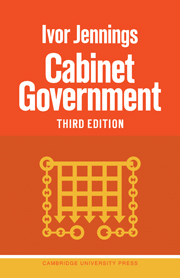Book contents
- Frontmatter
- Contents
- PREFACE
- CHAPTER I THE BRITISH CONSTITUTION
- CHAPTER II THE CHOICE OF A PRIME MINISTER
- CHAPTER III THE FORMATION OF A GOVERNMENT
- CHAPTER IV THE ADMINISTRATION
- CHAPTER V MINISTERS AT WORK
- CHAPTER VI INTER-DEPARTMENTAL RELATIONS
- CHAPTER VII TREASURY CONTROL
- CHAPTER VIII THE PRIME MINISTER
- CHAPTER IX THE CABINET
- CHAPTER X WAR AND DEFENCE
- CHAPTER XI ECONOMIC POLICY
- CHAPTER XII CONSTITUTIONAL MONARCHY
- CHAPTER XIII THE PERSONAL PREROGATIVES: DISMISSAL OF MINISTERS, DISSOLUTION OF PARLIAMENT, CREATION OF PEERS
- CHAPTER XIV PATRONAGE AND HONOURS
- CHAPTER XV GOVERNMENT AND PARLIAMENT
- APPENDIX I. GOVERNMENTS SINCE 1835
- APPENDIX II. EXAMPLES OF GOVERNMENTS
- APPENDIX III. THE PREROGATIVE OF DISSOLUTION
- APPENDIX IV. BIOGRAPHICAL AND BIBLIOGRAPHICAL NOTES
- INDEX
CHAPTER V - MINISTERS AT WORK
Published online by Cambridge University Press: 23 September 2009
- Frontmatter
- Contents
- PREFACE
- CHAPTER I THE BRITISH CONSTITUTION
- CHAPTER II THE CHOICE OF A PRIME MINISTER
- CHAPTER III THE FORMATION OF A GOVERNMENT
- CHAPTER IV THE ADMINISTRATION
- CHAPTER V MINISTERS AT WORK
- CHAPTER VI INTER-DEPARTMENTAL RELATIONS
- CHAPTER VII TREASURY CONTROL
- CHAPTER VIII THE PRIME MINISTER
- CHAPTER IX THE CABINET
- CHAPTER X WAR AND DEFENCE
- CHAPTER XI ECONOMIC POLICY
- CHAPTER XII CONSTITUTIONAL MONARCHY
- CHAPTER XIII THE PERSONAL PREROGATIVES: DISMISSAL OF MINISTERS, DISSOLUTION OF PARLIAMENT, CREATION OF PEERS
- CHAPTER XIV PATRONAGE AND HONOURS
- CHAPTER XV GOVERNMENT AND PARLIAMENT
- APPENDIX I. GOVERNMENTS SINCE 1835
- APPENDIX II. EXAMPLES OF GOVERNMENTS
- APPENDIX III. THE PREROGATIVE OF DISSOLUTION
- APPENDIX IV. BIOGRAPHICAL AND BIBLIOGRAPHICAL NOTES
- INDEX
Summary
The Qualifications of a Minister
The most elementary qualification demanded of a minister is honesty and incorruptibility. It is, however, necessary not only that he should possess this qualification but also that he should appear to possess it. Lord Palmerston laid down the obvious rule that ministers must not accept presents, but this sort of problem is rarely raised. In 1948 it was stated in Parliament that rumours were in circulation to the effect that ministers had received payments or other rewards in connection with applications for licences or permissions. By resolution of both Houses a Tribunal of Inquiry was set up under the Tribunals of Inquiry (Evidence) Act, 1921, with Mr Justice Lynskey as chairman, to inquire into these allegations. The Tribunal found that Mr John Belcher, M.P., Parliamentary Secretary to the Board of Trade, had received presents of wine and spirits, and certain other small presents, knowing that these were made for the purpose of securing favourable and expeditious treatment by the Board of Trade of applications for licences. Mr Belcher had resigned his office as soon as he had given evidence and applied for the Manor of Northstead (i.e. resigned his seat in Parliament) as soon as the decision was given against him. In the subsequent debate the Prime Minister discussed the question of
the extent to which ministers should accept hospitality from persons whose business brought them into relationship with their departments.
- Type
- Chapter
- Information
- Cabinet Government , pp. 106 - 133Publisher: Cambridge University PressPrint publication year: 1959



